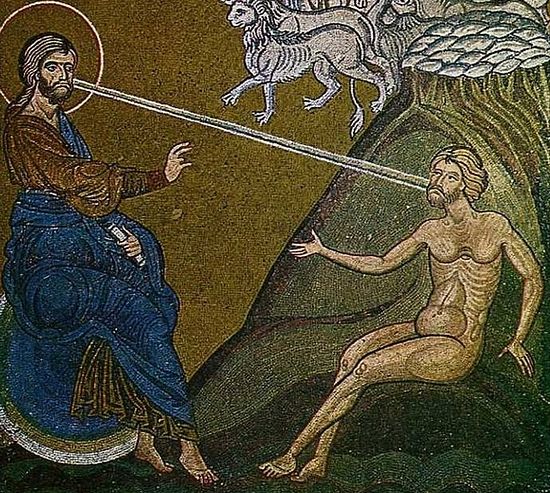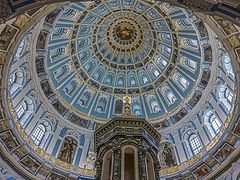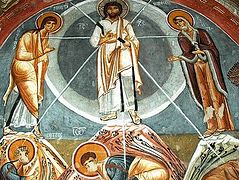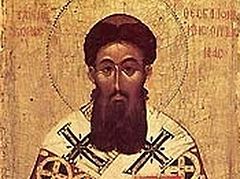From the book, Ascent to Taboric Light, by Archimandrite Cyprian (Kern).
 The creation of Adam.
The creation of Adam.
On the one hand, man was destined from the beginning for deification; on the other hand, through his ascetic efforts man corrects in himself what he does that is sinful, as a grandson of Adam. He purifies himself, conquers his passions, uproots his bad thoughts, enlightens his mind, simplifies it, “brings it to the One”, and as the supreme measure of enlightenment of the mind, becomes a “seer of supreme things”.
“In this way man becomes a vessel that is capable of receiving divine grace, which, as must continually be remembered, is not given for something, or in some measure proportional to our ascetic labors, but for the sake of something else, only out of God’s measureless love for us. There is no correlation between our ascetic labors and God’s grace.
“Human nature is capable of deification, and man was presented from eternity for unification with God. The Immaculate Lamb was predetermined for the slaughter even before the formation of the world. Therefore we can speak also of an eternal God-mankind.
“The divine Incarnation is not only a fact that happened once in history, but it has existed also from eternity in the divine Counsel as a present, supreme reality. Through His divine grace, God placed His own Self into this being, having created him in His own image and likeness, and exalted on earth the man who has come to know himself” (Archimandrite Cyprian is citing St. Gregory Palamas.—Ed.)
In the divine Incarnation, human nature is deified. Furthermore, Palamas emphasizes the dual significance of this act. First, it is the deification of our nature: “As He came down to earth without changing in His divinity, in condescending to us he ascends again without changing in His divinity, and raises up our nature that He took upon Himself to the Throne on high.” Second, this the deification of each of us: “The Word of God... purified our nature with the wondrous and unapproachable fire of His divinity... And not only that commixture, which He accepted for our sakes, but He has also divinely made a participant of the fire that the Lord came to bring down upon earth each of those who have become worthy of communion with Him.” “We all participate and will participate in the resurrection and ascension of our Savior, because He is the resurrection and ascension of human nature; and not only of human nature but also of everyone who believes in Christ and manifests that faith.”
Interestingly, here is emphasized not only the deification of mankind, but also of every person. Here is meant not the salvation of some vague mankind existing outside of a real person, but of each one of us. From this thesis St. Gregory draws important practical conclusions.
On the lips of the Savior, who said to Mary Magdalene, Touch me not; for I am not yet ascended to my Father (Jn. 20:17) echo the words, “The Body I am in now, that is, after the Resurrection, is robed in something easy to bear and more powerful than fire; and not only can it rise into heaven, but even to the very Father Who is above the heavens.” “The Lord raises up to heaven our commingled (natures) and as divine participants, made us to be co-enthroned with the Father.” By His ascension the Savior opened the path to heaven for every person. “As the worshipped Body of Christ, united in the same person with the Hypostatic Word of God, though it was parted from the soul in a three-day death, it did not however in any measure separate from the divinity; precisely also do those bodies that were prepared in the abode of the Holy Spirit separate after their deaths from the Divine Spirit, which had come to abide in them.” Man is allowed in this life to be “tempted by the devil, so that he would easily conquer that apostate from true life (the devil), righteously receive blessed immortality, and remain alive and divine for all ages.”
However, we mustn’t think that theosis (deification) is the lot of the righteous in the future life only. Gregory Palamas, as a mystic, knows otherwise. Like St Macarios, the Aeropagites, St. Maximos, and St. Symeon, he came to know by experience that the miracle of Mt. Tabor is not only a prefiguration of the future age, but also the inheritance of pure hearts in this life. The Savior takes with Himself to Tabor the “best” disciples, the chosen; this is one of the thoughts in the liturgical theology of the feast of the Transfiguration. In other words, by this is confirmed the known esotericism, the known hierarchical nature of the knowledge of God for Christians. Equality in knowledge and in divine life does not exist and cannot exist, as it does not exist at all in the divine plan. Only the chosen come to know what is supreme, only Peter, James, and John does the Lord take up to the “high mountain”, only the higher, those initiated in the mystery of sacred hesychia are given to be participants in Taboric transfiguration in this life as well. The path to this is ascetical. Its fruits are inexpressible. Here is an example of this.
“Hesychia [silence] consists in turning and gathering the mind within itself; especially in the turning to the mind of all the powers of the soul and their activity to be in accord with the mind and with God... As soon as the soul stops being distracted by various images, a person through great labors finds peace and attains tranquility; and as much as it is possible, comes to know God, thanks to Whom he exists. This all surpasses his own nature and leads to participation in divine nature, continually pushing forward to what is better.” This divine participation and illumination with heavenly uncreated light is basically the sphere of saints. “The apostles Peter and Paul shine upon the greatest powers above the heavens and above the earth (that is, to the angels) with their light, with whom is no variableness, neither shadow of turning (James 1:17). They not only lead those sitting in darkness to this wondrous light, but also, by spreading light, turn those who participate in it into light, and make them into the offspring of perfect light, so that each of them shines forth like the sun in the future Coming and glorious appearance of the Author of Light and the Divine Logos. Being such lamps for each other, they bring light today to us also and illumine the Church.”
Palamas expresses this thought in his praise of both St. John the Baptist and Holy Great Martyr Dimitry. St. Peter the Athonite “overcame human nature and attained to divine transformation for supernatural perfection.”
In deification, beginning in this manner to be realized already here on earth, but becoming perfect only in the Kingdom of Glory, is God’s plan for man brought to fulfillment. “He Who created the hearts of all” (cf. Ps. 32:15) and Who appeared to us in the flesh, now desires to create in us who are lost such hearts as He originally placed in our souls when He created us. For He created the original image in accordance with the future teaching, and then brings the teaching into accord with the original creation, without producing anything else, as cleansing the beauty of the creation that was darkened by accepting sin.” Christ chose His apostles from amongst the poor, ignorant, and simple people; but should even the poorest, simplest, and most ignorant person show his readiness and proper care for beauty, he can not only come to know divine teachings, but can himself also become a teacher by grace.” In this St. Palamas sees the realization of our adoption as sons of God; or, in other words, our deification.
It is important that in spiritual perfection, man can become higher than the angels, and even illumine the angels themselves. Not only the angels are the “second lights” that reflect the first, divine light to people. Man himself can rise higher than the angels; he himself can become a direct participant in divine light-emanation. Not only in the hypostasis of the God-man is human nature exalted higher than the angelic ranks (liturgical theology of the feast of the Ascension), but man himself as such can surpass the angels in the light of grace.
We recall that for Palamas, man is in a certain sense higher than the angels, greater than them, created according to the image and likeness [of God]. Hierarchism is not violated by this. Hierarchy is observed not in degrees of bodilessness, but in degrees of maturity for receiving God, of deification. The angels are given to be only reflections of light, but man is predestined to become God. The divine Logos did not become a God-angel, but the God-man. From eternity man in his entirety, that is, in his entire psychophysical composition, is divine. Not a single theological system outside of Orthodoxy has ever reached such exalted thoughts about man.
To all cited above on deification in the teaching of St. Gregory Palamas, a certain notation of a physiological nature must be added. An understanding of this thesis became especially close to the minds of Orthodox theologians in the fourth century. This word [theosis/deification] and its derivatives came into use, beginning with St. Athanasius, by all writers of the Eastern Church. But besides the terms theosis, deification, godlikeness, and so on, the holy fathers at times—and Palamos most often of all—also use the expression: God-participation/divine participation. We consider it beneficial to say a few words about the meaning that the fathers and writers of the Church ascribed to this term.
As far as we know, this is a new word. The ancient world did not know it. That is why it does not appear in ordinary schoolbook lexicons. In Russian translations, inasmuch as those translations of the holy fathers where it is found have been translated into Russian, it is signified by a word that is absolutely unacceptable in literature: “kupno Bog” [“conjointly God”], but in the translation of St. John Damascene by Prof. A. Bronzov, as “participants of the same divinity”.
As far as we know, this expression was first uttered by St. Gregory the Theologian in his 45th homily “On Holy Pascha”; then we find in it the Aeropagites, in St. Maximos the Confessor, in St. Anastasios the Sinaite, St. John Damascene, St. Theophanes Keramaeus, St. Theophanes of Nicea, and finally, St. Gregory Palamas. The meaning with which is it used is not all the same with each.
One meaning is given it by the Aeropagites. In chapter 1, §5, “On the divine names”, is written, “And when we expound the theological description, such as: The One, Unknowable, Super-existing, Self-goodness, which is the very God, then the Trinitarian Unit, equal in divinity and equal in goodness—we can neither express it in words nor understand it.”[1] It is perfectly clear that this expression (“equal in divinity”) relates to the entire Holy Trinity. The same meaning is given to it in the corresponding scholia of St. Maximos the Confessor: He [Dionysios] calls the All-Holy Trinity equal in divinity.”
A completely different meaning—Christological—is given this word by all the other above-named writers. St. Gregory the Theologian in his 45th homily “On Holy Pascha” used it in an explanation of the text of Exodus (12:5) on the Paschal Lamb: “The Lamb is perfect not only in its Godhead, in comparison with Whom there is nothing more perfect, but also in the nature it received, which was anointed by the Godhead and became the same with the Annointer, and I dare to say it, a participant in the divinity.” St. John Damascene in the first chapter of the third book, “Exact Exposition of the Orthodox Faith” says concerning this passage: “We should know that it is said about the Lord’s flesh that not by reason of the transformation of nature, or changes, or alterations, or mingling was it deified and made participant in the same Godhead and God; as St. Gregory the Theologian says, ‘from this does one deify, and the other is deified and, I make bold to say it, made a participant in the same Godhead’.”
Further Damascene develops the thought of the unification of natures and hypostases of the Savior, making use of the usual comparisons of hot iron or coal, which is used in patristics from the time of Origen, St. Cyril of Alexandria, and Theodoret of Cyrus.
St. Athanasius the Sinaite (seventh century) writes, “Therefore we call the all-holy body of Christ divine, and all that is bodily divine, and His most pure soul co-divine, and all that is inherent to the soul, divine and participating in God.”
Theophan Kerameus, bishop of Rossano in Calabria (seventh century), in “Discouse 36” says, “The received human nature, directly united with the Godhead in Hypostasis, became a participant in God, not having been changed into the nature of the Godhead.”
Theophan, Metropolitan of Nicea and Palamas’ contemporary, in letter 3, §4 writes about how “in His becoming man, the Logos made our comingling God-participating; that is, nature received by Him.”
Thus, in all five of these last texts the word in question has a Christological meaning. We find the very same content about it with St. Gregory Palamas. We have been able to find this expression eight times in his works that we had at our disposal. Essentially this needs to be boiled down to seven texts, because it is found once in “Confession of the Orthodox Faith” as a doublet of the eighth discourse, said in the first week of Lent. Here are examples.
In the fourth discourse, Palamas says, “The glory of His divinity in His first Coming was hidden beneath the body that He took on from us and for our sakes, and now it hides in heaven near the Father with God-participating flesh; then, that is, at the Second Coming, He will reveal His glory.” In the eighth discourse: “Having appeared after the Resurrection and ascended into the heavens, and being seated at the right hand of the Father, He made our body, as God-participating, equal in honor and co-enthroned with the Father.” It is the same in “Confession of the Faith”. In the fourteenth discourse: “So great, divine, ineffable, and beyond thought is it that our nature becomes a participant in the Godhead, and thanks to that, we are given the possibility to ascend to the better; and this has remained a truly unknowable mystery hidden throughout eternity from the holy angels, and people, and the prophets and spirit-seers themselves.” In the nineteenth discourse: “Only He, having resurrected Himself on the third day, did not return again to the earth but carried up to heaven our comingling, and, as God-participating, made it co-enthroned with the Father.” In the twenty-first discourse: “The Word of God, having hypostatically united our nature with Himself... and cleansed it with the wondrous and unapproachable fire of His divinity from all passionate inclinations, has made it a participant in the Godhead and as if glowing [hot]. And a little further on: “The Lord... having ascended in glory and entered into the Holy of Holies not made by hands and seated at the right hand of greatness in the heavens, having made the body, as God-participating, co-enthroned with the Father.” In the forty-second discourse: “The Lord touched the bed (of the son of the widow of Nain) in order to show that His own body, as God-participating, has life-creating power; and He said, “Young man, I say unto thee, arise” (Lk. 7:14).
From what has been cited here it is clear that the term God-participating is used by Palamas in its Christological meaning, applicable to the human nature of Christ. By force of His deification this nature is carried up by the Savior to the Throne of glory on high. Palamas emphasized that the Savior’s flesh became God-participating not only after its ascent to heaven, but during the course of His earthly life, as is said in the miracle of the resurrection of the young man from Nain.
From what has been said it is clear that this nature could have become deified only because it was predisposed and predetermined for this from eternity. In the plan of creation, in the world of the divine Logos concerning the world and man, our nature was given us predetermined to be the fleshly garment of the Savior. It follows that our nature was intended to be God-participating even in God’s Pre-eternal Counsel.
This word can only be translated into Russian as “богопричастный-bogoprichastny” (“God-participating”, “participating in the Godhead”), but by no means “равнобожественный-ravnobozhestvenny” (“equal in divinity”), in analogy with “единосущный-edinosushchny” (“one in nature”). “Equal in divinity” can only be allowed, in the words of Sts. Dionysios the Areopagite and Maximos the Confessor, where they talk about the “Trinity equal in divinity”. If we were to likewise translate this word in its Christological application, then we would be giving it a broadened meaning, for which the very sense of these texts in no way give us license. If we were to in fact explain this word as “equal in divinity”, then the meaning of being one-in-essence with God would be ascribable to human nature or the Savior’s flesh.
The fathers we have cited speak of the God-participation of Christ’s flesh. From this it follows that our nature was from eternity predestined for this God-participation, which is why we can speak of eternal God-humanity. But we can by no means conclude from this that human nature is one in essence with divine nature, which has, nevertheless, been present in the history of dogma. St. Athanasius in his “Epistle to Epictetus, bishop of Corinth” rebukes precisely those who thought that the “body born from Mary is of one essence with the Godhead of the Word”. This would have meant that “the Godhead Himself, of one essence with the Father, was circumcised and from perfect became imperfect.” “The Word Himself did not change into flesh,” says St. Athanasius, “but appeared in the flesh”. “A great co-unification took place for the human body from the Word’s communion and unification with it. For from mortal it became immortal; as being of the soul[2] it became spiritual; being from the earth, it entered through the heavenly gates.” “The body, as the temple of the Word, was filled with divinity.”
In conclusion we shall also remember that man is not simply a fact of this empirical world, but also an idea that can be accomplished, God’s plan that can be revealed for the best of His creations. This world is created by God’s word. God pronounces His word, “let there be”, and one cycle of this universe after another comes into being. God, the Holy Trinity, having crowned this created world, pronounces His life-breathing word: “Let us make man...” And at this command to be, man is called to bring to completion this task, to reveal this plan, to bring into being the idea that pre-existed from eternity. Man must respond to this life-creating word. God waits for this human response. That is why man is responsible, because it is his task, as a rational and reasoning being, to respond to God, to respond with all his being, with the totality of his humanity. And thanks to the incarnation of the Word, His voluntary self-limitation, thanks to—as we shall say in the words of Fr. Paul Florensky—the idea of divine humility, of God’s self-deprecation, “this idea gave for the first time grounds for recognizing the creature as independent and therefore morally responsible for itself before God.” Thus Emil Brunner[3] rightly notes in the best work that Western thought has given to Christian anthropology in recent times, “Man is a ‘theological’ essence, a creation whose calling is to ‘abide-in-God-the-Word’. In everything that he is, in all that he does, says, and thinks, man gives a response to the life-creating word. And not only does he give a response, he himself is that response. Human existence therefore, as opposed to all other existence, is a responsible existence.”
Man is responsible before God in the fulfillment and revelation of the plan that God has willed from eternity. Man, as a “divinely rational” being, is called to life, and to respond to this word about existence. He is called to fulfill his task creatively, that is, wisely and freely. He is called to create in moral, spiritual, intellectual, and aesthetical spheres. He is called to rise and walk along that path shown him by the God-man, Who said of Himself: I am the way, the truth, and the life.
Where does this path lead? The answer can only be one word: to deification. Or we shall say in the last words spoken before his death by St. Gregory Palamas himself: “To the hieghts... to the heights... to the Light.”



